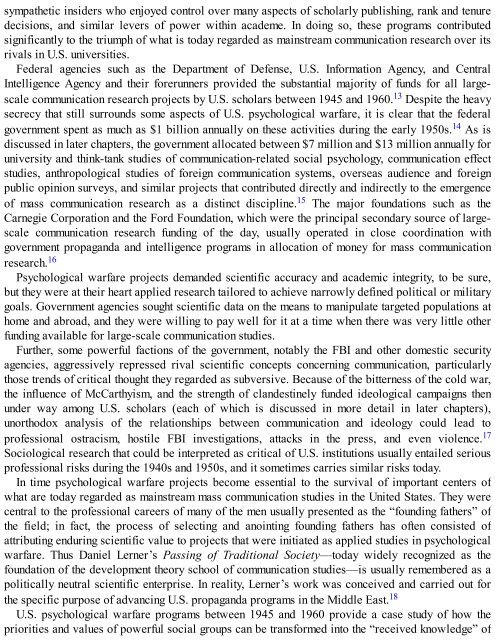9842659846
You also want an ePaper? Increase the reach of your titles
YUMPU automatically turns print PDFs into web optimized ePapers that Google loves.
sympathetic insiders who enjoyed control over many aspects of scholarly publishing, rank and tenure<br />
decisions, and similar levers of power within academe. In doing so, these programs contributed<br />
significantly to the triumph of what is today regarded as mainstream communication research over its<br />
rivals in U.S. universities.<br />
Federal agencies such as the Department of Defense, U.S. Information Agency, and Central<br />
Intelligence Agency and their forerunners provided the substantial majority of funds for all largescale<br />
communication research projects by U.S. scholars between 1945 and 1960. 13 Despite the heavy<br />
secrecy that still surrounds some aspects of U.S. psychological warfare, it is clear that the federal<br />
government spent as much as $1 billion annually on these activities during the early 1950s. 14 As is<br />
discussed in later chapters, the government allocated between $7 million and $13 million annually for<br />
university and think-tank studies of communication-related social psychology, communication effect<br />
studies, anthropological studies of foreign communication systems, overseas audience and foreign<br />
public opinion surveys, and similar projects that contributed directly and indirectly to the emergence<br />
of mass communication research as a distinct discipline. 15 The major foundations such as the<br />
Carnegie Corporation and the Ford Foundation, which were the principal secondary source of largescale<br />
communication research funding of the day, usually operated in close coordination with<br />
government propaganda and intelligence programs in allocation of money for mass communication<br />
research. 16<br />
Psychological warfare projects demanded scientific accuracy and academic integrity, to be sure,<br />
but they were at their heart applied research tailored to achieve narrowly defined political or military<br />
goals. Government agencies sought scientific data on the means to manipulate targeted populations at<br />
home and abroad, and they were willing to pay well for it at a time when there was very little other<br />
funding available for large-scale communication studies.<br />
Further, some powerful factions of the government, notably the FBI and other domestic security<br />
agencies, aggressively repressed rival scientific concepts concerning communication, particularly<br />
those trends of critical thought they regarded as subversive. Because of the bitterness of the cold war,<br />
the influence of McCarthyism, and the strength of clandestinely funded ideological campaigns then<br />
under way among U.S. scholars (each of which is discussed in more detail in later chapters),<br />
unorthodox analysis of the relationships between communication and ideology could lead to<br />
professional ostracism, hostile FBI investigations, attacks in the press, and even violence. 17<br />
Sociological research that could be interpreted as critical of U.S. institutions usually entailed serious<br />
professional risks during the 1940s and 1950s, and it sometimes carries similar risks today.<br />
In time psychological warfare projects become essential to the survival of important centers of<br />
what are today regarded as mainstream mass communication studies in the United States. They were<br />
central to the professional careers of many of the men usually presented as the “founding fathers” of<br />
the field; in fact, the process of selecting and anointing founding fathers has often consisted of<br />
attributing enduring scientific value to projects that were initiated as applied studies in psychological<br />
warfare. Thus Daniel Lerner’s Passing of Traditional Society—today widely recognized as the<br />
foundation of the development theory school of communication studies—is usually remembered as a<br />
politically neutral scientific enterprise. In reality, Lerner’s work was conceived and carried out for<br />
the specific purpose of advancing U.S. propaganda programs in the Middle East. 18<br />
U.S. psychological warfare programs between 1945 and 1960 provide a case study of how the<br />
priorities and values of powerful social groups can be transformed into the “received knowledge” of









![Genki - An Integrated Course in Elementary Japanese II [Second Edition] (2011), WITH PDF BOOKMARKS!](https://img.yumpu.com/58322134/1/180x260/genki-an-integrated-course-in-elementary-japanese-ii-second-edition-2011-with-pdf-bookmarks.jpg?quality=85)
![Genki - An Integrated Course in Elementary Japanese I [Second Edition] (2011), WITH PDF BOOKMARKS!](https://img.yumpu.com/58322120/1/182x260/genki-an-integrated-course-in-elementary-japanese-i-second-edition-2011-with-pdf-bookmarks.jpg?quality=85)





